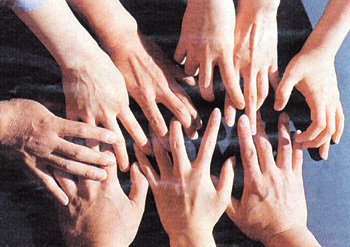Hands, Hotbed of Germs of Various Kinds
Hands, Hotbed of Germs of Various Kinds
Posted April. 13, 2003 22:13,

Dr. John Naphere from the U.S. pointed out in his book called `the Mystery of Hands` that without hands there must have been no evolution of mankind, and Russian poet Geogiff Brodsky said that hands are the edge of our mind.
Hands are a big headache to doctors treating infectious diseases, however. They explain that hands are a lot dirtier than socks-covered feet since they have constant contacts with all different kinds of objects.
Dr. Gwon Joon-wook from the National Health Institute, an organization now in a war against SARS, or severe acute respiratory syndrome, said that people can protect themselves from the killer virus and other infectious diseases by `washing hands often and thoroughly`.
Recent studies in the U.S. indicates that if medical professionals wash their hands properly, they can reduce the rate of infection in hospitals by 40 to 50% without tens of millions of dollar-worth sterilizers and disinfectors.
There is no definite answer to how SARS is infected among people. It is clear that the virus is transmitted by saliva, but it is still uncertain whether it is air-borne. Some suggest that infection is related to feces. Experts emphasize, however, that people can protect themselves by keeping their hands clean.
Although infected saliva can reach as further as 1 to 2 meter, but it is still rare for the drops of saliva to enter directly your nose or mouth. Most times, they stay on your cloths or body. Then you tend to touch them with your hands and touch your nose or mouth later. If SARS is air-borne, the virus, remaining after saliva dries out, gets mixed with particles in the air and floats around. You have to wear masks, but still you touch infected particles with your hands, which leads to respiratory infection.
If you wear a N95 protection mask, it stops infected particles or saliva from flowing in. But if you are not families of patients, medical professionals or those working at airports, you do not have to wear the mask necessarily. You are still required to wash your hands thoroughly to prevent infection through feces.
The rub is that few people wash their hands thoroughly. You have to wash hands after returning to home; before and after preparing food; and after using the toilet. It is better to wash your hands as often as possible. You have to teach children to wash their hands at least after getting home, before meals and after using the toilet.
It is important to use soap to foam enough and wash it out with running water. You have to lock your fingers together to rub particles off. You are especially required to wash the thumbs thoroughly. Then, wash the backs of your hands as well as the palms. The last part is to line the tips of fingers and rub them against each other.
Medial professionals do not wear a ring since there can be germs between the ring and the finger. If you wear a ring, you have to take it off before washing. You are advised to use paper towels instead of cotton towels when dry your hands.
There are automatic devices such as pedals, allowing users not to touch the tap themselves for hygienic reasons. When you turn off the tab, you are highly likely to touch the germs on the tab.
If you have a habit of touching the face, you must stop doing that. If your children turn pages after lubricating their fingers with saliva, tell them not to do so. The New York Times recently advised its readers to use soil when they cannot find soap. It said that people would not touch their faces with the filthy hands until they wash them thoroughly with soap. Hands are, indeed, a hotbed of germs.
- Dr. Kim Joon-myong, professor of internal medicine of infectious diseases at Yonsei Univ. and Dr. Choi Gwang-won, professor of internal medicine of infectious diseases at Seoul National Univ.
Seong-Ju Lee stein33@donga.com







